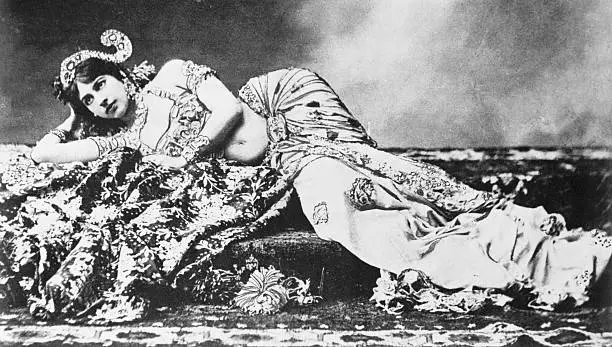The Powerful Legacy of Mata Hari’s Tragic Fate
On October 15, 1917, the world watched in shock and horror as one of the most famous women of her time, Mata Hari, was executed in Paris. Her crime? Spying for the Germans during World War I. However, the evidence against her was weak, and many believed that she was simply a victim of prejudice and war hysteria. In this article, we will explore the tragic tale of Mata Hari’s execution, her life and career, the accusations of espionage, the trial and execution, and her legacy and impact.
Mata Hari’s Life and Career:
Mata Hari, whose real name was Margaretha Geertruida Zelle, was born in the Netherlands in 1876. She had a difficult childhood, marked by poverty and abuse, and married at the age of 18 to escape her situation. She moved to the Dutch East Indies with her husband, but the marriage was unhappy, and she eventually left him and returned to Europe.

Exotic Dutch dancer Mata Hari who lived in France and was executed as a German spy in World War One, pictured in Paris practicing her Javanese Temple dance to music played by an Indian orchestra on sitars.
In Paris, Mata Hari reinvented herself as an exotic dancer, using her looks and charm to attract wealthy and powerful men. She quickly became a sensation, performing across Europe and earning a reputation as a seductress and femme fatale. Her success as a performer allowed her to live a luxurious lifestyle and travel the world, but it also made her a target of envy and suspicion.
Accusations of Espionage:
During World War I, Mata Hari’s travels and relationships with high-ranking military officials made her a prime target for suspicion of espionage. She was accused of being a German spy, using her seductive charms to extract military secrets from her lovers and pass them on to the enemy. However, the evidence against her was largely circumstantial and based on intercepted communications, which were open to interpretation.
Despite her protestations of innocence, Mata Hari was arrested in February 1917 and put on trial in July of that year. The trial was marked by sensationalism and prejudice, with the prosecution paints Mata Hari as a dangerous seductress and traitor to her country. The defense argued that she was simply a naive and innocent victim of circumstances, but the jury was swayed by the prosecution’s arguments and found her guilty.
The Trial and Execution:
Mata Hari’s trial was a media sensation, with reporters from around the world covering the proceedings. Her status as a foreigner and her reputation as a seductress made her an easy target for prejudice and bias, and many believed that the trial was unfair and politically motivated. However, the French authorities were determined to make an example of her and show that they were taking the threat of espionage seriously.
On October 15, 1917, Mata Hari was executed by firing squad in the courtyard of the Saint-Lazare prison in Paris. Her death was met with shock and outrage, with many believing that she had been unfairly targeted and that justice had not been served. The circumstances surrounding her trial and execution have been the subject of much debate and speculation over the years, with some arguing that she was a scapegoat for the failures of the French military, while others suggest that she was indeed involved in espionage.

The spy Mata Hari facing her firing squad. Secret papers made public for the first time today disclose that she was covertly monitored by British Intelligence.
Legacy and Impact:
Mata Hari’s execution has come to symbolize the dangers of prejudice and scapegoating in times of war, as well as the power of myths and legends to shape our understanding of historical events. Her story has inspired countless books, films, and songs, and her legacy continues to fascinate and intrigue people to this day.
However, the truth of Mata Hari’s life and career is more complicated than the myths and legends that have grown up around her. While she was undoubtedly a remarkable woman, her involvement in espionage remains a matter of debate, with some arguing that she was more of a low-level agent than a master spy.
Mata Hari’s execution was a tragic event, a victim of the political and social forces of her time. While her legacy continues to inspire and intrigue people to this day, her story is also a reminder of the importance of fairness, justice, and due process in our legal system. As we look back on her life and career, we must remember the lessons that can be learned from her story, and work to ensure that such injustices do not occur again in the future.

